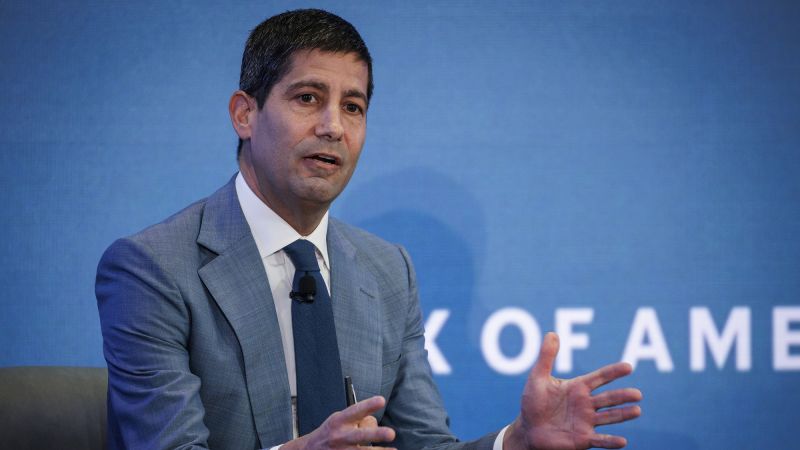In a recent statement, President Donald Trump expressed clear animosity toward Jerome Powell, the Chairperson of the Federal Reserve. Trump, attending a specific event in the Oval Office, conveyed his belief that Powell’s removal is overdue, ironically declaring that his “termination can’t come fast enough.” He indicated that if Powell continues on his current path, he would be removed “real fast.” This statement signals not only a deep-seated dissatisfaction with Powell’s leadership but also raises questions about the boundary of presidential authority, especially regarding appointments and dismissals in the Federal Reserve.
Despite Trump’s vocal criticisms, many experts argue that he does not possess the legitimate power to terminate the Fed chair due to their policy differences. The independence of the Federal Reserve has been a cornerstone of U.S. monetary policy, and any attempt by a sitting president to interfere could have severe repercussions for the integrity of financial institutions and markets. Trump’s remarks underscore his readiness to challenge established norms, demonstrating a willingness to depart from tradition amid the prospect of significant consequences.
On the horizon, speculation is building regarding the potential replacement for Powell in light of his term, set to expire in May 2026. One prominent contender emerging from these discussions is Kevin Warsh, a former governor of the Federal Reserve. Warsh has previously been considered for key positions under Trump, including a bid for the Treasury secretary role during the president’s second term. His candidacy for the Fed chair continues to gain traction, particularly as the Trump administration initiates processes for appointing Powell’s successor.
Treasury Secretary Scott Bessent discussed the timeline for interviewing candidates to succeed Powell, indicating that discussions will commence “sometime in the fall.” As rumors intensify around Trump possibly ousting Powell before the term concludes, Bessent emphasized the importance of maintaining stability in monetary policy, referring to it as a “jewel box that’s got to be preserved.” However, these comments reflect the tension between political ambitions and economic stewardship.
Delving into Warsh’s professional background, the 55-year-old has a robust portfolio in finance and economic policy. Before his career at the Federal Reserve, he held influential positions, including vice president at Morgan Stanley and special assistant for economic policy during President George W. Bush’s administration. His academic credentials include a law degree from Harvard University—though notably, like Powell, Warsh lacks a formal graduate degree in economics.
Appointed by Bush to the Federal Reserve Board of Governors in 2006, Warsh played a crucial role during the financial turmoil that characterized the Great Recession. As the chief liaison to Wall Street, he was involved in high-stakes negotiations, including the controversial handling of Bear Stearns and the significant decision to allow Lehman Brothers to collapse—events that are still debated within economic circles today. Warsh departed from the Fed in 2011 after expressing dissent against policies aimed at aggressive monetary expansion, notably a plan to purchase $600 billion in bonds.
In recent engagements, Warsh has become a vocal figure in the ongoing dialogue regarding inflation, notably co-authoring an opinion piece in The Wall Street Journal that criticized both governmental spending levels and the Fed’s monetary policies during the pandemic. His views resonate with a segment of conservative economists who believe that fiscal policy choices, rather than purely external factors, significantly led to rising inflation rates.
Amongst his current roles, Warsh serves as a distinguished economics fellow at the Hoover Institution, a prominent conservative think tank, and as a visiting scholar at Stanford University. His connections to influential political figures and his outspoken critiques of the Fed’s management of inflation position him as a compelling candidate for a pivotal role in U.S. financial policy.
Furthermore, Warsh’s family ties add another dimension to his profile; he is married to Jane Lauder, a prominent figure in the cosmetics industry and granddaughter of Estée Lauder, which potentially could raise his visibility and influence. His perspectives on economic challenges and the Federal Reserve’s trajectory indicate a complex interplay of professional qualifications and personal beliefs.
In summary, the ongoing discourse surrounding Jerome Powell’s tenure and the speculation about Kevin Warsh’s potential leadership reflect the dynamic nature of U.S. monetary policy amid political fluctuations. As discussions regarding the economy evolve, the implications of leadership changes within the Federal Reserve will likely shape financial landscapes for years to come. Warsh, with his extensive credentials and ideological leanings, could usher in a new era at a time when the U.S. economy is grappling with unprecedented challenges.



